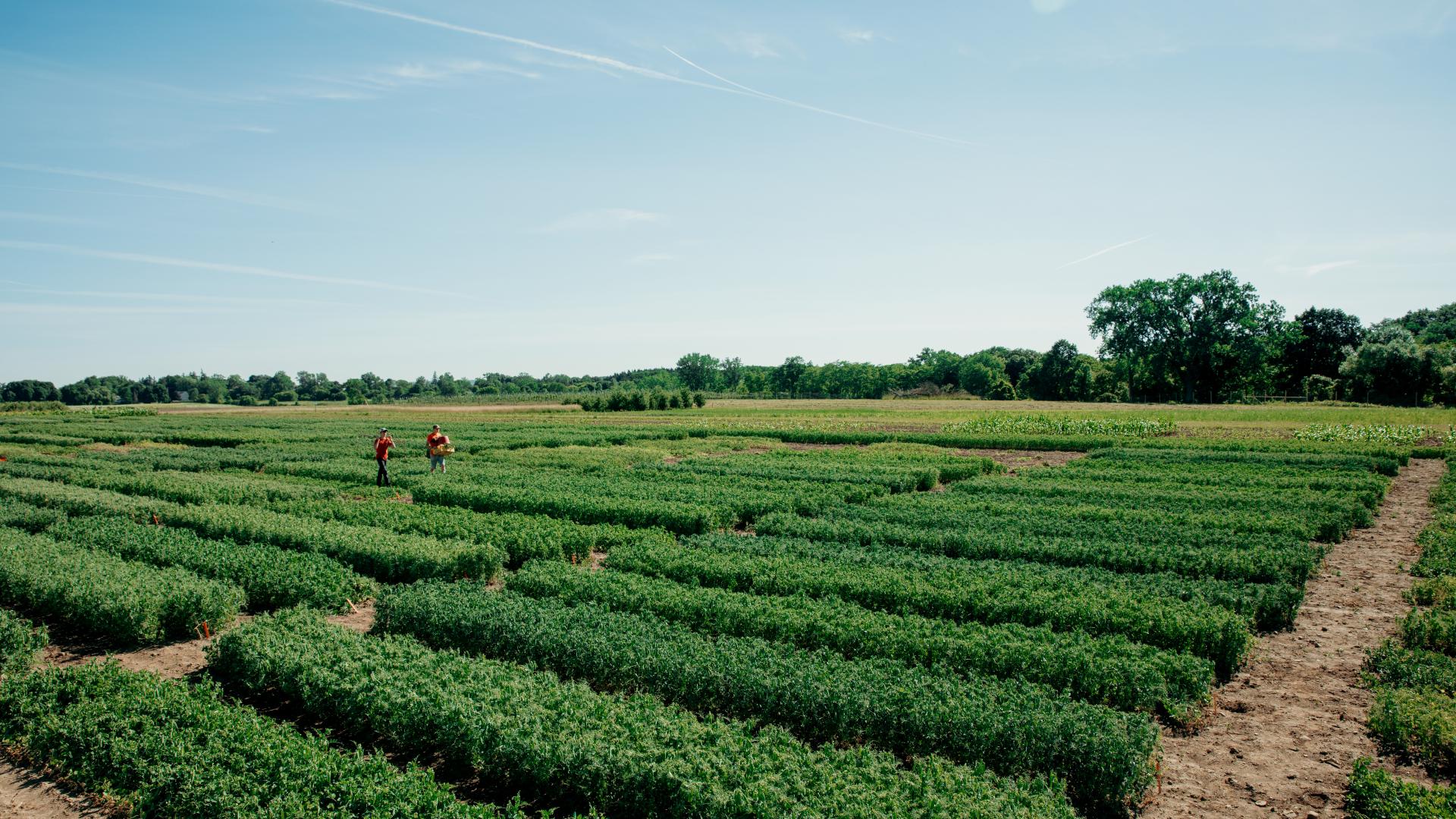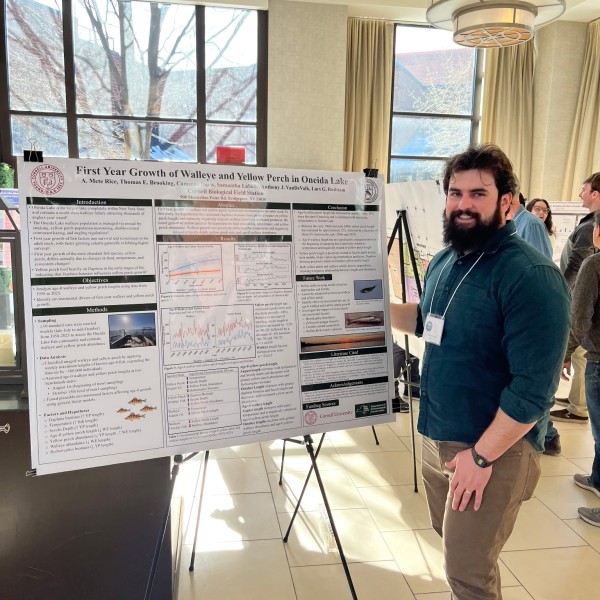As Community Food Systems minors, students engage with community-based organizations to gain rich, hands-on experiences in the food system. This narrative is a reflection of Madeline Hanscom’s practicum experience with Seed to Supper.
The purpose of the Seed to Supper practicum is to facilitate a discussion with Master Gardeners about the social injustices embedded in the food system. Throughout the year-long Seed to Supper practicum, students learn how to address this topic and effectively engage individuals in a facilitatory learning experience. At the end of the year, students open a dialogue with Master Gardeners from throughout New York State to discuss how these injustices impact people of different demographics. Additionally, students emphasize that Master Gardeners play a crucial role in helping to mitigate the effects of such injustices by conveying how educational community gardening practices can help individuals reclaim their right to nutritious and accessible food in a budget-friendly way.
This was the “big day.” Today, I was presenting the final presentation for the Seed to Supper program. My palms were sweaty and my mouth was dry with anticipation. I sat in the stained lounge-style camp chair that I’d owned since freshman year of college. My laptop laid across from me poised atop the windowsill, the warm sun keeping my features from dissolving into my Zoom background. If I needed to ground myself throughout the presentation, I could glance over my laptop at the lone 10-foot-tall tree that sat across the road.
I intently watched the participant count on Zoom climb through double and triple digits. Somewhere on the other side of Ithaca, my co-presenter Alyssa was doing the same. Outside of the pandemic, I would usually be nervous presenting to over 120 Master Gardeners, most of whom were at least twice my age. I thought that would be different if those Master Gardeners were all packed into my 13 inch computer screen. It wasn’t.
My face glowed a deep shade of pink as I began by introducing myself, talking with my hands even though they weren’t in frame. All was well as I turned on “autopilot,” passionately talking about how community gardens can help combat food deserts and food swamps, and how social identities can greatly contribute to the hardships that people face. In the midst of the audience’s silence, the nervous feeling melted, and my eyes drifted away from the participant count. My empty apartment was filled only with the sound of my voice and the musings of the birds that live deep inside the well-groomed hedge that grows below my window.
Alyssa and I had practiced this presentation countless times and it was going just about as well as we could have imagined, when I suddenly heard the rumblings of a rogue unmuted microphone. Naturally, I assumed that someone had joined the Zoom meeting late for personal reasons, and didn’t know how to mute themselves. Next thing I know, an empty black window with “My iPhone” comes to the forefront of my computer screen, outlined in yellow, and a lady’s voice erupts: “Why do we need to know this if we’re just gardening? I need to know how to plant my plants, and grow them. Why does some social identity matter if we’re gardening?”
There I sat in my three year old camp chair, staring out the window just above my webcam, subtly panicking, while 122 other Master Gardeners actively waited for my response. As I scoured the Zoom screen, I could even see the panic in Alyssa’s eyes.
It was a fair question.
To be honest, I don’t even know how I answered it. I remember the feeling of panic far more than I recall the words that Alyssa and I said. I know the thoughts that ran through my head as I struggled to squeeze a ginormous concept into a concise, three-sentence answer that would keep our presentation going in a timely fashion. Three sentences couldn’t possibly do this justice.
Maybe I would have remembered this exchange better if I had seen that lady’s face once I answered, if I had known her name. Instead, all I got was a pitch-black rectangle that simply transitioned from displaying a white microphone to displaying a red microphone with a hash mark running through it, as my remarks faded into a pregnant pause.
Half a decade ago I was living in rural Maine, a teenager without a clue about what it meant to be socially conscious. I grew up, went to college, and realized that there’s a lot more going on in the world and in people’s lives than what meets the eye. Sometimes I forget that as I’ve grown, I’ve had to let go of some parts of who I once was, in favor of becoming a better version of myself. I embarked on a mission to be an “academic” and to help the people I’ve seen struggle, but I forgot that not everybody is on that mission. Many people stay in their hometown, and are never presented with a reason to question the beliefs they grew up with, or a reason to expand their way of thinking.
Although I’m sure I touched on some of these ideas as I responded to this person, in an ideal world, I would have told them this:
It is important to account for social identities because a community member cannot serve the community if they don’t accept the inequalities that lie within it. Some people may be going through more hardships than others, for less obvious reasons. A life of food insecurity is hard to imagine, and it’s difficult to accept that many people have to wonder where their next meal will come from. Food tends to be more of a question for those of lower socioeconomic status, and those who experience systemic racial discrimination. Most grocery stores choose not to be located in areas where people are enduring such struggles (i.e. in low socioeconomic status communities) because at the end of the day, they are trying to profit. For some, community gardens are the only available source of fresh, nutritious food.
Heading a community garden and an accompanying education program are not simply gardening jobs that need to be completed for the sake of getting them done. We are not just growing nutritious foods, we are growing people, and cultivating an accepting community that refuses to be a part of a discriminatory system.
About the author
Madeline Hanscom ‘22 is a senior majoring in Human Development and minoring in both Community Food Systems (CFS) and Plant Science. Her interest in food has been ongoing ever since she watched the Food Network as a child. For her first jobs, she picked strawberries on a strawberry farm and worked as a Sous chef at a farm-to-table cafe in high school. Since her time at Cornell, Madeline has been increasingly drawn to food justice overall, and particularly social justice surrounding food access.
During her sophomore spring she began an independent research project (partnered with Edward Spang at UCDavis) investigating food waste perception and food loss during the pandemic. More recently, she participated in Anabel’s Grocery, a food justice oriented on-campus grocery store, and took numerous classes concerning unique approaches to reforming the food system and the inequities within it. For her CFS practicum, she worked with the Seed to Supper program, helping inform Master Gardeners throughout New York State about the importance of community gardening to mitigating social inequities and access to nutritional food.
Read the entire Community Food Systems 2022 narrative series.





